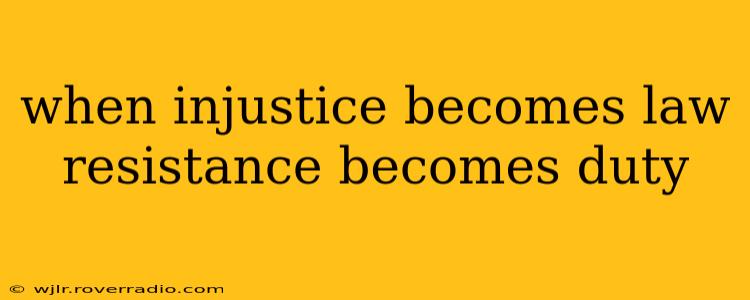The famous quote, "When injustice becomes law, resistance becomes duty," often attributed to Thomas Jefferson, though its origin is debated, encapsulates a powerful concept at the heart of civil disobedience. This principle argues that when a governing body enacts laws that are fundamentally unjust or violate fundamental human rights, citizens have not only the right but also the moral obligation to resist those laws. But what constitutes injustice? What forms does resistance take? And what are the ethical considerations surrounding such acts of defiance? This exploration delves into these crucial questions.
What Constitutes Injustice?
Defining injustice is complex and often depends on individual perspectives and societal values. However, some common indicators of injustice include:
- Discrimination: Laws that unfairly target specific groups based on race, religion, gender, sexual orientation, or other characteristics. Examples include Jim Crow laws in the United States or apartheid in South Africa.
- Violation of Human Rights: Laws that infringe upon fundamental human rights, such as freedom of speech, assembly, religion, or the right to a fair trial.
- Oppression: Laws designed to maintain power imbalances and suppress marginalized communities. This can manifest through economic exploitation, political disenfranchisement, or systemic violence.
- Lack of Due Process: Laws that deny individuals fair legal proceedings, denying them the right to a proper defense or impartial judgment.
- Corruption: Laws that are created or enforced for personal gain rather than the public good.
These examples highlight that injustice isn't simply about disagreement with a law; it’s about systemic violations of fundamental principles of fairness, equality, and human dignity.
What Forms Does Resistance Take?
Resistance to injustice can take many forms, ranging from peaceful protests to more direct action. Some common methods include:
- Civil Disobedience: This involves intentionally breaking unjust laws as a form of non-violent protest, often accepting the consequences to highlight the injustice. Examples include the Civil Rights Movement's sit-ins and boycotts.
- Peaceful Protests: Marches, demonstrations, rallies, and petitions are common ways to express dissent and raise awareness about injustice.
- Civil Resistance: A broader term encompassing various non-violent methods to challenge unjust systems, including boycotts, strikes, and non-cooperation.
- Whistleblowing: Revealing information about unethical or illegal activities within an organization or government.
- Activism: Engaging in various activities to advocate for social change and challenge injustice. This includes lobbying, grassroots organizing, and educational campaigns.
The choice of resistance method is crucial and often depends on the specific context, considering potential risks and the desired impact.
What Are the Ethical Considerations?
While resistance to injustice is often justified, it's essential to consider the ethical implications:
- Proportionality: The response to injustice should be proportionate to the harm caused by the unjust law. Excessive force or violence can undermine the moral legitimacy of the resistance.
- Non-Violence: Many advocates argue that non-violent resistance is morally superior, as it minimizes harm and avoids escalating conflict. However, the effectiveness of non-violent resistance varies depending on the context.
- Due Process: Even in acts of civil disobedience, it’s important to respect the rule of law as much as possible, while still challenging its injustice.
- Impact on Others: Resisting injustice should always consider its potential impact on innocent bystanders and the broader community.
Weighing these ethical considerations is crucial to ensure resistance remains morally justifiable and effective.
Is Resistance Always a Duty?
While the quote suggests a direct correlation between injustice and the duty to resist, the reality is more nuanced. The decision to resist is a deeply personal one, influenced by individual values, beliefs, and risk assessment. Factors such as the severity of the injustice, the potential consequences of resistance, and the likelihood of success all play a role. There may be situations where the potential harm of resistance outweighs the benefits. However, the core principle remains – when faced with significant injustice, actively considering and potentially participating in resistance is a moral imperative deserving of serious contemplation.
How Can We Engage in Responsible Resistance?
The key to effective and ethical resistance lies in thoughtful planning and action. This includes:
- Careful Assessment: Thoroughly evaluate the nature and severity of the injustice, the potential consequences of resistance, and the likelihood of success.
- Strategic Planning: Develop a well-defined plan of action that minimizes harm and maximizes impact.
- Non-violent Approach: Prioritize non-violent methods of resistance whenever possible.
- Building Alliances: Collaborate with others to strengthen the movement and amplify the message.
- Open Dialogue: Engage in open dialogue and respectful debate to foster understanding and build consensus.
The concept of resisting injustice is fundamental to a just and equitable society. Understanding the nuances of injustice, the various forms of resistance, and the associated ethical considerations is crucial for individuals seeking to participate in meaningful and impactful change. The decision to resist is a personal one, but the underlying principle remains: when laws violate fundamental human rights and principles of justice, the call to action resonates powerfully.
